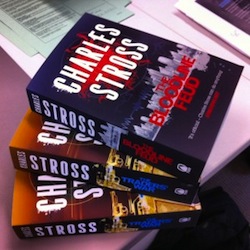All that is old is new again; I began writing this book in late 2002, but this is the first time it’s been published in the original form I intended. How did we get here? Let’s take a trip down memory lane….
Back in 2002, an eleven-years-younger me had just sold his first two SF novels to Ace, an American imprint of Penguin. As is usually the case, the contract for the books gave Ace the right of first refusal on my next SF novel. “But they won’t be interested in seeing your next until the first two are in print, which will take a couple of years,” said my literary agent. “So why don’t you write a big fat fantasy or alternate history series, something which isn’t SF, so I can sell it elsewhere?” (I love my agent: she’s got all the cold-blooded business sense that I missed out on at birth).
One thing led to another, and I came up with a plan for gigantic parallel-universe techno-thrillers about folks from another time-line who have the ability to visit our own, and the toppling domino-stack of terrible consequences that unwind when their existence is uncovered. Then I wrote the first book. It weighed in at around 500 pages, and my agent liked it and made some suggestions, and I re-drafted it at 600 pages, and then she tried to sell it. Actually, she tried to auction it in New York for (insert obligatory Dr Evil poke-lip-with-little-pinkie reference here) “one MEEELLION dollars,” but New York Publishing was having a lie-in that day and only one bidder turned up: Tor US, with an offer for … well, it was a lot less than a million bucks but it kept the wolf from the door for a few months.
My editor at Tor US is one of the grand old men of the SF field, and he likes to edit. He also knew about Penguin’s right of first refusal and was a bit leery of the idea of getting into a squabble with a rival publisher. So he spun my big fat thriller as high fantasy. And then, for some reason, he sent me an email: “Charlie, can you cut this in half? It’s too long; we need to run this series as 300-page novels.”
I got this memo just as I was a couple of hundred pages into writing the second gigantic techno-thriller, which as planned was going to run to around 800 pages. Being a professional, and in favour of getting paid, I hacksawed the first book into two pieces… then found myself writing a somewhat slack third book (for it was merely the set-up for a big fat thriller), and a Marketing-issued edict to “make it look like fantasy.”
Which is how I ended up with a six-volume fantasy series instead of the first two books in a parallel-universe techno-thriller series. (My agent got Ace to pencil in an exception on their right-of-first-refusal for the Merchant Princes books, but it only kicked in with book no. 4.)
Let’s fast-forward eight years.
A little over a year ago I got an email from Bella, who was then my editor at Orbit (who published my SF in the UK). “Hi Charlie! I’m sorry to be delivering this news, but I’m moving on to a new job—as editor at Tor in the UK. So I guess I won’t be editing you any more….”
“Really?” I replied: “you know Tor US have got the rights to six of my novels in the UK? And some of them are unpublished?”
One thing led to another, and, ultimately, to this essay. Because time had moved on, and it seemed like a good idea, when Bella proposed a plan to publish the original six books as omnibus editions (The Bloodline Feud, The Traders’ War and The Revolution Trade), I suggested doing a complete re-write of the series. I could then reassemble them into their original trilogy format, as per my initial intention. The second original (800 page) doorstep had metastasized into four thinner books in the States totaling 1,300 pages in the writing; a lot of fat had to go for the Tor US editions, but it would still end up as two big books for the UK, the middle and final volumes of a trilogy.
The first omnibus (The Bloodline Feud) was easier to reassemble, but I like to think I’m a better writer than I was a decade ago, and some of the sentence structures made me wince, and there were errors that needed fixing, and one thing led to another. In the end, the project took about six months and changed enough stuff to justify the new titles; if you read the original American market version of this series you might notice some differences. (Microsoft Word assures me there are about 12,000 of them, or around 6-7 changes per page.)
In my next article I’m going to talk about what the Merchant Princes series is about—not what happens in it, but what it all means.
This article originally ran on the Tor UK blog.
Charles Stross has has worked as a pharmacist, software engineer and freelance journalist, but now writes full-time. To date, Stross has won two Hugo awards and been nominated twelve times. He has also won the Locus Award for Best Novel, the Locus Award for Best Novella and has been shortlisted for the Arthur C. Clarke and Nebula Awards.










